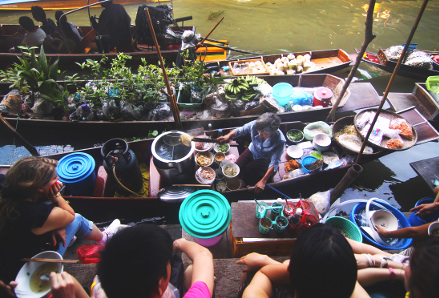What is culture shock?
The Merriam-Webster dictionary defines culture shock as “a feeling of confusion, doubt, or nervousness caused by being in a place (such as a foreign country) that is very different from what you are used to.”
In travel, culture shock usually occurs when a person goes to a place with a culture very different from their own. It creates temporary psychological stress from being overwhelmed by the new culture and not knowing how to adapt or fit into the new environment. Culture shock can affect anyone but it’s most common in students, expatriates, or travellers on long-term trips.
Coping with culture shock
Common signs of culture shock include feeling insecure, inadequate, confused, isolated, angry, or irritable; homesickness; being unable to focus on work or study; having negative feelings about the country you’re living in; avoiding contact with locals; or spending a lot of time alone or with other international travellers and expatriates.
The first step to coping with culture shock is simply to acknowledge that it exists. Dealing with culture shock involves accepting that you need time to understand the culture of your host country. Learning more about your host country, meeting new people, and keeping in touch with family and friends back home can also help. IAMAT-affiliated doctor Mark Wise provides a useful list of coping strategies for culture shock.
Reverse culture shock
Reverse culture shock occurs when a traveller has problems re-adapting to life back at home. Travellers may expect that when they return home, everything will be exactly the same as when they left, but that’s usually not the case. You may find that you have grown apart from friends and family or missed important events in their lives. Travellers who have been away for extended periods of time may find it challenging to get back into the routine at home once they’ve become used to life in another country.
The signs of reverse culture shock are similar to culture shock, except that they are directed at the traveller’s home country and culture. To overcome reverse culture shock, try exploring your home country with a traveller’s curiosity; meeting others who have returned from abroad or long-term travellers and expatriates living in your own country; keeping in touch with friends you made abroad; or volunteering for an organization that can benefit from your international experience.
Taking care of your mental health
Mental health is an important part of our overall health, and stress from travel or existing psychological conditions can make culture shock more difficult to deal with. Whether you are going abroad or have recently returned, knowing how to manage travel stress and keeping in touch with friends and family can help you stay well.
Culture shock doesn’t have to be an unpleasant experience. If you approach travel with an open mind and you’re ready to immerse yourself in your host culture, culture shock can help you grow as a traveller and a person.
Learn more about coping with culture shock
IAMAT’s Travel and Mental Health Series includes tips for coping with culture shock, travel stress, depression, anxiety, substance abuse, and psychosis.
Coping with culture shock – Government of Canada
Experiencing culture shock – Canadian Bureau for International Education
Culture shock: Tips for teens – Kids Health
Reverse culture shock – Students Abroad
From a personal perspective
Home sweet home? Dealing with reverse culture shock – Forbes
Blog: Dealing with reverse culture shock – Ytravel
Post by Daphne Hendsbee.
Photo by Harvey Enrile, Unsplash.



